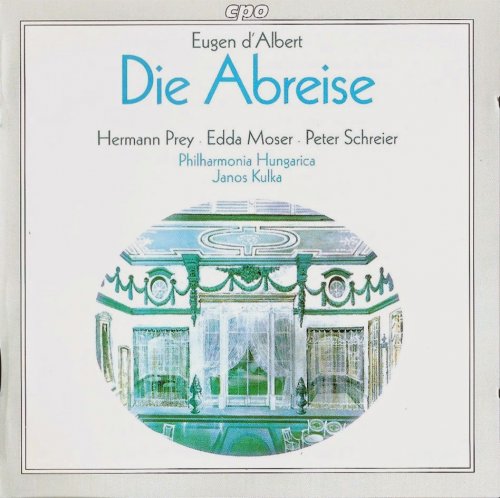
Philarmonia Hungarica, Janos Kulka - Eugen d'Albert: Die Abreise (1998)
BAND/ARTIST: Philarmonia Hungarica, Janos Kulka
- Title: Eugen d'Albert: Die Abreise
- Year Of Release: 1998
- Label: CPO
- Genre: Classical
- Quality: FLAC (image+.cue,log,scans)
- Total Time: 45:50
- Total Size: 236 Mb
- WebSite: Album Preview
Tracklist:
01. Introduction [0:06:50.52]
02. Prelude - Scenes 1-20 [0:39:00.13]
Performers:
Hermann Prey
Edda Moser
Peter Schreier
Philarmonia Hungarica
Janos Kulka - conductor
01. Introduction [0:06:50.52]
02. Prelude - Scenes 1-20 [0:39:00.13]
Performers:
Hermann Prey
Edda Moser
Peter Schreier
Philarmonia Hungarica
Janos Kulka - conductor
The fourth of d'Albert's twenty operas, "Die Abreise" ("The Departure") was premiered in 1898 at Frankfurt. In a single 40 minute act, its story is very slender indeed. A man (Gilfen) suspects his wife (Luise) of being unfaithful to him with a friend (Trott) so pretends to go away on a journey. Returning "unexpectedly" he finds Luise rejecting the advances of Trott who is summarily ejected. A reconciliation between Gilfen and Luise ensues.
The story is taken from a play by A. von Steigentesch. I don't suppose that they were battering down the theatre doors to get in but they may have done so to hear d'Albert's operatic version. It is quite delightful. The booklet notes make a convincing case for "Die Abreise" as being the ancestor of the modern musical comedy, drawing parallels with later operas by Wolf-Ferrari and Richard Strauss. However, don't be misled. "Die Abreise" is very much an opera. It is a through composed and fast-moving conversation piece. There are no show-stopping arias, the singers' arioso style often flowering into melody, however. Much of the musical interest is in the orchestra which uses tunes from the scintillating overture to provide a commentary on events. It may be a good idea, then, to listen to the overture a few times before progressing to the opera itself. That will be no hardship; you will want to in any case. A number of new musical ideas are introduced in the opera including a a languorous descending idea on the strings, a delicious waltz and a spinet-accompanied (it's a piano on this recording) strophic song, the only self-contained number in the score, for Luise. There is also some fine lyrical music towards the end when Gilfen and Luise are reconciled. D'Albert was an eclectic composer and there is some Lisztian thematic transformation. Notice, for instance, how, at 15 mins 35 secs, the perky main theme of the overture is transformed into a minor mode lament for the lower strings.
The performance on this disc is excellent with all three principals in fine voice, though I am not a particular fan of Prey's fruity baritone. It is a distinctive voice, though. The Philharmonia Hungarica in 1979 was not a top notch ensemble and a few more desks of strings would not have come amiss but the orchestra plays with plenty of verve under Kulka's lively baton. The recording places the voices just a little too far forward but the orchestra is kept well in the picture. The only real complaint is that no libretto is provided although I don't suppose you'll have trouble following the plot if you have any German.
If you can find this disc at a sensible price, don't miss it!
The story is taken from a play by A. von Steigentesch. I don't suppose that they were battering down the theatre doors to get in but they may have done so to hear d'Albert's operatic version. It is quite delightful. The booklet notes make a convincing case for "Die Abreise" as being the ancestor of the modern musical comedy, drawing parallels with later operas by Wolf-Ferrari and Richard Strauss. However, don't be misled. "Die Abreise" is very much an opera. It is a through composed and fast-moving conversation piece. There are no show-stopping arias, the singers' arioso style often flowering into melody, however. Much of the musical interest is in the orchestra which uses tunes from the scintillating overture to provide a commentary on events. It may be a good idea, then, to listen to the overture a few times before progressing to the opera itself. That will be no hardship; you will want to in any case. A number of new musical ideas are introduced in the opera including a a languorous descending idea on the strings, a delicious waltz and a spinet-accompanied (it's a piano on this recording) strophic song, the only self-contained number in the score, for Luise. There is also some fine lyrical music towards the end when Gilfen and Luise are reconciled. D'Albert was an eclectic composer and there is some Lisztian thematic transformation. Notice, for instance, how, at 15 mins 35 secs, the perky main theme of the overture is transformed into a minor mode lament for the lower strings.
The performance on this disc is excellent with all three principals in fine voice, though I am not a particular fan of Prey's fruity baritone. It is a distinctive voice, though. The Philharmonia Hungarica in 1979 was not a top notch ensemble and a few more desks of strings would not have come amiss but the orchestra plays with plenty of verve under Kulka's lively baton. The recording places the voices just a little too far forward but the orchestra is kept well in the picture. The only real complaint is that no libretto is provided although I don't suppose you'll have trouble following the plot if you have any German.
If you can find this disc at a sensible price, don't miss it!
Classical | FLAC / APE | CD-Rip
As a ISRA.CLOUD's PREMIUM member you will have the following benefits:
- Unlimited high speed downloads
- Download directly without waiting time
- Unlimited parallel downloads
- Support for download accelerators
- No advertising
- Resume broken downloads


